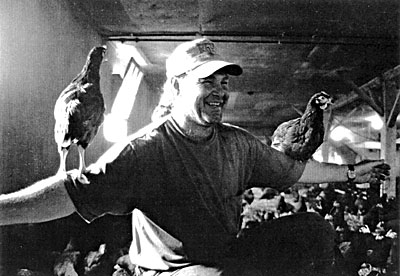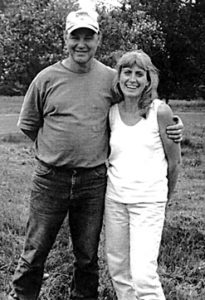 |
| Jim Hannah has his chickens trained well – or vice versa. English photo. |
By Jean English
Jim Hannah and Deborah Banks raise happy hens: 3,000 happy hens, in fact, all with room to roam and with feed to satisfy the most gourmand among the flock. Their Hilltop Farm in Dexter is, as far as Hannah knows, the largest certified organic egg operation in Maine.
The couple did not anticipate getting into the fowl business. Originally from Massachusetts, where he was a commercial fisherman for 20 years and she grew up on a dairy farm, they moved to Dexter about four years ago, planning a life of peace and quiet, and started a “little garden” to go along with their modest goal. Friends started complimenting them on their produce and asking if they could buy some of it. Likewise with a small laying flock that they kept: Friends liked the eggs that came from hens that were raised almost as pets.
“So we did 200 of all types of breeds,” says Hannah. “We went through all of the problems. I read and read and read. I’ve got the bird situation under hand now.”
They settled on Rhode Island Reds as the most productive birds and tended a flock of three hundred. “The amount of feed they eat is moderate compared with all other [breeds],” says Hannah. “For what you feed them and the size they get and the size of eggs, they’re more efficient all around.”
The eggs from this initial flock were sold to individual customers, while produce from the farm was sold to individuals and to local stores. These stores told Hannah that his eggs were “never going to sell” because the prices were too high. However, these stores underestimated the demand for fresh, local, organic eggs. “They sold so well at Shop ’n Save that they wanted more for other stores,” says Hannah. He sells his eggs to the stores for $3.00/dozen for Jumbo, $2.75 for Extra Large, $2.50 for Large, and $1.33 for 6-packs of large. The stores add 50 to 75 cents. Even at these prices, Hannah’s eggs are less expensive than those trucked in from the nearest organic farms of any size: Country Hen in Ohio, Hood, and Manitoba Egg – partly because of reduced transportation costs. Also, “I don’t have a big margin of profit,” he says. “I do it to provide a good product and to make people happy.”
 |
| Jim Hannah and Deborah Banks thought that they would lead a quiet, simple life in Dexter, but have ended up tending 3,000 laying hens and raising vegetable crops for a CSA and for local stores. English photo. |
He praises The Chicken Handbook by Gail Damerow (Storey Communications, 1994) as “the best book on chickens, real informative.” From this and other sources, he learned that “you should always give birds a vitamin pack; it’s high in riboflavin. That eliminates such problems as paralysis and curly toe.” Hannah and Banks order vitamin packs from Jeffers (P.O. Box 100, Dothan AL 36301-0100; Tel. 1-800-JEFFERS). The $2.30 Avian Super Pack that he uses makes 250 gallons when mixed with water, and he gives it to his chicks, right in with their water, until they’re four weeks old.
Riboflavin and electrolytes are good for older birds, too, says Hannah, and he makes a point of providing them on hot days.
The hens get an organic feed mixed and delivered by Vermont Organic Grain Co. (P.O. Box 98, Randolph VT 05060; Tel. 802-234-5433), a special blend that Dr. Mike Opitz, poultry pathologist from the University of Maine, helped concoct for optimum nutrition for the Rhode Island Reds. After receiving a chick feed for eight weeks, the birds move on to a grower mix that includes corn, corn mids, soy, sunflower, minerals and kelp. “The University is surveying the need for organic grain in Maine,” says Hannah. “They think there’s a great need for organic grains” here. Right now, Vermont Organics is bringing 24,000 pounds to Maine two to three times a week. Hannah used to get his grain delivered in bags but now buys in bulk.
After their initial success, Hannah and Banks added 2,000 birds and then another five hundred. They are raising their most recent addition of 500 chicks on feed that would make the eggs high in health-promoting omega-3 fatty acids.
Hannah says that they’re raising their birds as if they were back in the ’40s, except that “now we know more about how to feed them for health.” If the birds have to go on antibiotics, the eggs can’t be sold as organic for 90 days after withdrawal from antibiotics, “so it’s better to build their immune systems so that you don’t have problems,” he says.
The birds are raised on the top story of a 175-foot-long, three-story barn that has 6400 square feet on each floor. He could raise up to 2,133 birds on each floor, “but the cost of feed limits how fast we can build the flock,” he says. “For six months, it’s all investing” while waiting for the hens to reach laying age. In addition, he wants to keep the operation small to limit the number of employees he hires. Right now he has one part-time person helping.
The barn has 9 inches of insulation in its low ceiling, so it holds the heat well. Hannah put in an 875-gallon propane heater and is pleased with the efficiency of the barn’s heating and insulation system.
The hens roam freely throughout the top floor of the barn, which has 4 to 5 inches of shavings on the floor to satisfy University and MOFGA recommendations. Hannah says he’d rather have no shavings and clean the manure out of the barn a couple of times a week, but, for the sake of certification, he is going along with the recommendations. The shavings do provide insulation as well as a medium for absorbing manure and ammonia. He buys the shavings by the truckload and cleans them out of the barn twice a year.
To keep eggs clean and avoid the need for washing them, laying nests are cleaned every night, before hens lay in the morning.
In addition to the eggs, Hannah and Banks raise 10 acres of organic vegetables on their 38 acres of tillable land. They are interested in producing more winter storage crops to extend the selling season, and to that end are building an underground storage building. The vegetables that they raise now are sold to IGAs, Shop ’n Saves, and “all the noncorporate stores,” and they hope to do a CSA next year.
They don’t want to expand too fast, though. “I need to have a system perfected here before expanding my markets,” says Hannah. “I want to perfect the birds this year.” He’ll be trying to sell 2,000 to 3,000 eggs per day starting this September, and “I need a home for those eggs every day or every other day.” Associated Grocers is one possible outlet. Hannah likes dealing with IGA stores too, because they’re small and personable.
Hannah hopes to develop markets within a 50-mile radius, and then head toward Bangor and Portland. If he can find enough markets on a well-defined route, he’ll deliver the eggs himself. He’s looking for stores, restaurants, inns – places with “people who will appreciate” quality eggs. Banks points out that in lower New England, organic foods have been widely popular for a long time among people who have “really taken care of themselves, educated people.” Now that appreciation for quality is increasing in Maine, she believes.
Their omega-3 eggs, which they are producing mainly by adding flax seed to the feed, fall into that category. Eggs from their 500-bird flax-fed flock will be put in cartons with special stickers on them advertising the fact. Hannah adds that their organic eggs, whether omega-3 or not, are high in healthful carotenes.
Hannah and Banks can be reached at 924-3652.
